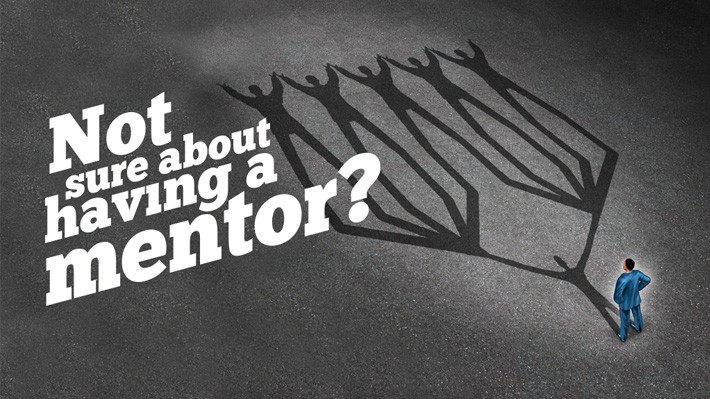Not sure about having a mentor? These alternatives might suit you better
You’ll struggle to scroll through your LinkedIn newsfeed without finding at least one post or article discussing mentoring: the benefits it brings, the different experiences that people have, or perhaps, the challenges of finding the right mentor for you. These days most companies seem to operate some form of mentorship programme, and there’s rarely been more discussion of the benefits that an experienced professional helping to guide your career can bring. We’re more aware than ever of the positive impact that someone who inspires you at work can have on career satisfaction and development. A mentor can be great for building connections, expanding knowledge outside your core role and focusing your career.
But is being mentored really for everyone? That’s a question that occurs to me when I consider recent LinkedIn research showing that only 26% of professionals currently have a mentor – someone who isn’t their immediate manager that they can go to for career guidance.
Part of the explanation for this might be a lack of suitable mentors out there – or a lack of genuine support from businesses for this kind of activity. However, I don’t think that’s the whole story. I suspect that there are plenty of people for whom a formal one-to-one mentor relationship just doesn’t feel right: it feels too demanding (of both you and your potential mentor), you feel there’s a risk of getting bad advice, or you just don’t feel open to one individual influencing your career that way.
Why mentors aren’t the only source of career guidance
If these are your instincts, then it’s easy to feel locked out and excluded from the whole mentorship conversation. However, you shouldn’t. Having one specific mentor that you meet with to talk about your career is just one option for accessing guidance and ideas that can help you to develop professionally. If that doesn’t appeal to you at this point in time, it doesn’t mean that you’re any less driven, ambitious or open to learning. You just need to unlock alternative forms of career guidance. And there are alternatives out there.
Speaking personally, I’m one of those for whom a single, formal mentor has never quite felt right. I’ve come to recognise that mentoring will work best for me if it happens organically, and grows out of my existing professional contacts and relationships. Equally, a change in circumstances could provide a trigger. If I find myself working on a new concept, project or launch, then approaching potential mentors might suddenly feel more natural. I’d have a clear focus for their support, which would unlock more value from the relationship. I’m open to these things happening – open to mentoring opportunities as they emerge. However, that doesn’t mean I have to go without guidance and inspiration in the meantime. That’s where those mentoring alternatives come in.
Alternative Number 1: the value in virtual mentors
I was introduced to the first of these through The Sophisticated Marketer’s Podcast, and the episode in which Jason Miller discussed different views of mentoring with James Altucher, one of the most successful motivational writers around at the moment. James believes in the value of ‘virtual mentors’. He argues that people should look to unearth one relevant takeaway from each piece of culture they consume, constantly seeking inspiration and finding alternative perspectives on their career. For me, it's usually movies. I'm that person who asks questions throughout. It might be a bit annoying for those watching with me – but it’s a great way to make sure you’re thinking about what you’re watching, rather than just consuming it.
Alternative Number 2: your Personal Board of Directors
I was introduced to the second alternative to formal mentoring by LinkedIn’s UK Country Manager and VP EMEA, Joshua Graff. We’re lucky enough to have regular sessions with our company’s leaders, talking about their career experience, life story, interests and ambitions – and this can result in some hugely valuable advice. This was one of those occasions. Josh’s mentoring concept is one that hugely resonated with me – and I imagine it will resonate with plenty of other people as well.
The concept that Josh introduced was a Personal Board of Directors. A company’s Board is a group of people (the more diverse and independent the better), who have one shared objective: they are committed to the success of the company. A Personal Board of Directors plays a similar role for you as an individual. It’s a small, informal group of people who can inspire, motivate and challenge you. It's the people you can turn to for advice and those you can bounce ideas against.
The first step is selecting and defining your Personal Board. You could start by defining what you'd like your directors to help you achieve: maybe a promotion, a new role or a new skill. Then figure out who needs to be on the Board to help make that happen, and then approach the relevant people. However, the process of appointing your Board doesn’t have to work this way. Just because the way that you think about your Board is structured and focused, doesn’t mean that your relationship with the different directors has to a formal one.
How I built my Board of Directors in secret
The thing that appeals to me about the Board of Directors concept is that it can be quite a relaxed process. The members of the Board don't need to meet, or even know that they are part of it. It's up to you to figure out how you'd like to engage each person and start arranging meetings or informal conversations. The Board of Directors concept gives you focus about who you need to engage for which specific purpose, but you can then go about engaging with them in the way that feels most natural to you.
When I heard Joshua talking about the personal Board of Directors concept, I realised I’d already started to create my own. One director was actively helping me to change roles from Ad Operations to Marketing, without being aware that they were a member of my Board. This was a colleague who was helping me to understand better what I wanted from my career, build the right connections within the new team, practice interview questions and scenarios. They were there for the entire experience.
Recognising the value in your existing relationships
I’m now in the fortunate position of having a very varied and diverse Board of Directors – and the process of appointing that Board has often involved my simply recognising the roles that different people can play in my life. My Board of Directors includes ex-managers and colleagues, but also my best friend and my Mother, who are far removed from the corporate world. It's a fluid list and it'll keep changing as my career develops and my life progresses. I’m lucky enough to have plenty of people around me, from different walks of life, whom I trust. They might not all have the same understanding of my industry or my job, but the important thing is that they know me in various capacities and can offer advice, challenge me and talk me down when necessary from all of these different perspectives. That’s the real value in a Board of Directors – it recognises the immense potential for career advice and guidance that might already exist in those around you.
Since that session with Joshua Graff, I’ve developed a far deeper appreciation for the very different sources of inspiration available to me. They may be less formal than a single mentor would be – but they’ve been no less helpful in moving my career forward. What’s more, these relationships feel mutually beneficial. The more I think about it, the more I believe I’m on the Board of Directors for other people at different times, whether they know it or not. I certainly hope so. Having felt the value that it can bring, it’s something I’m definitely motivated to share.
Related articles



